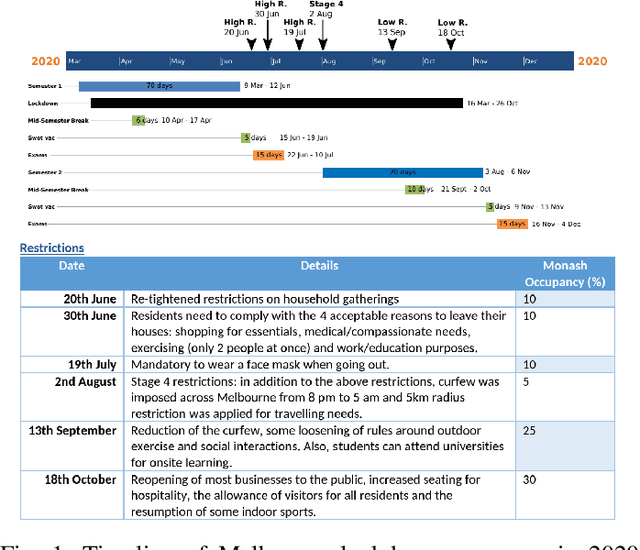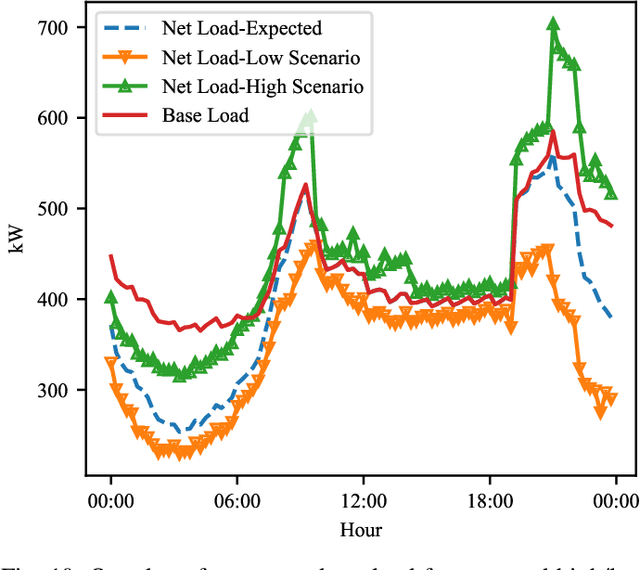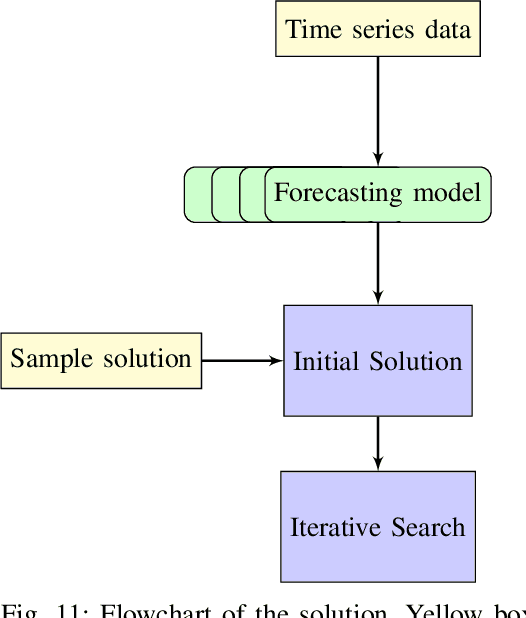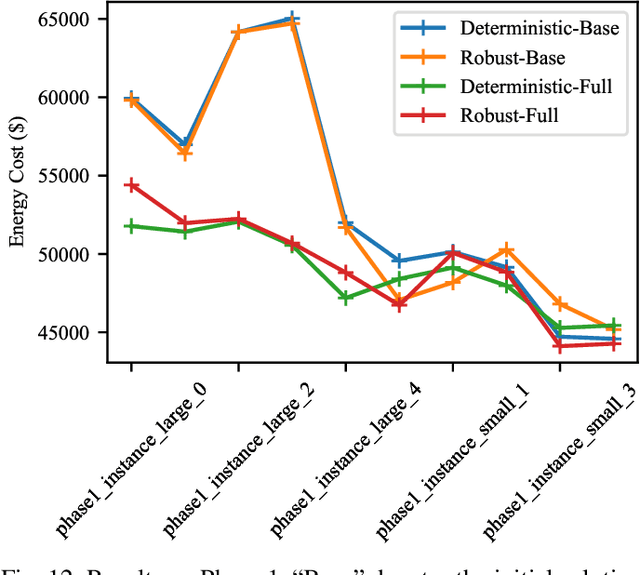Frits de Nijs
Human-in-the-Loop AI for HVAC Management Enhancing Comfort and Energy Efficiency
May 09, 2025Abstract:Heating, Ventilation, and Air Conditioning (HVAC) systems account for approximately 38% of building energy consumption globally, making them one of the most energy-intensive services. The increasing emphasis on energy efficiency and sustainability, combined with the need for enhanced occupant comfort, presents a significant challenge for traditional HVAC systems. These systems often fail to dynamically adjust to real-time changes in electricity market rates or individual comfort preferences, leading to increased energy costs and reduced comfort. In response, we propose a Human-in-the-Loop (HITL) Artificial Intelligence framework that optimizes HVAC performance by incorporating real-time user feedback and responding to fluctuating electricity prices. Unlike conventional systems that require predefined information about occupancy or comfort levels, our approach learns and adapts based on ongoing user input. By integrating the occupancy prediction model with reinforcement learning, the system improves operational efficiency and reduces energy costs in line with electricity market dynamics, thereby contributing to demand response initiatives. Through simulations, we demonstrate that our method achieves significant cost reductions compared to baseline approaches while maintaining or enhancing occupant comfort. This feedback-driven approach ensures personalized comfort control without the need for predefined settings, offering a scalable solution that balances individual preferences with economic and environmental goals.
Comparison and Evaluation of Methods for a Predict+Optimize Problem in Renewable Energy
Dec 21, 2022



Abstract:Algorithms that involve both forecasting and optimization are at the core of solutions to many difficult real-world problems, such as in supply chains (inventory optimization), traffic, and in the transition towards carbon-free energy generation in battery/load/production scheduling in sustainable energy systems. Typically, in these scenarios we want to solve an optimization problem that depends on unknown future values, which therefore need to be forecast. As both forecasting and optimization are difficult problems in their own right, relatively few research has been done in this area. This paper presents the findings of the ``IEEE-CIS Technical Challenge on Predict+Optimize for Renewable Energy Scheduling," held in 2021. We present a comparison and evaluation of the seven highest-ranked solutions in the competition, to provide researchers with a benchmark problem and to establish the state of the art for this benchmark, with the aim to foster and facilitate research in this area. The competition used data from the Monash Microgrid, as well as weather data and energy market data. It then focused on two main challenges: forecasting renewable energy production and demand, and obtaining an optimal schedule for the activities (lectures) and on-site batteries that lead to the lowest cost of energy. The most accurate forecasts were obtained by gradient-boosted tree and random forest models, and optimization was mostly performed using mixed integer linear and quadratic programming. The winning method predicted different scenarios and optimized over all scenarios jointly using a sample average approximation method.
Model-Free Approach to Fair Solar PV Curtailment Using Reinforcement Learning
Dec 13, 2022Abstract:The rapid adoption of residential solar photovoltaics (PV) has resulted in regular overvoltage events, due to correlated reverse power flows. Currently, PV inverters prevent damage to electronics by curtailing energy production in response to overvoltage. However, this disproportionately affects households at the far end of the feeder, leading to an unfair allocation of the potential value of energy produced. Globally optimizing for fair curtailment requires accurate feeder parameters, which are often unknown. This paper investigates reinforcement learning, which gradually optimizes a fair PV curtailment strategy by interacting with the system. We evaluate six fairness metrics on how well they can be learned compared to an optimal solution oracle. We show that all definitions permit efficient learning, suggesting that reinforcement learning is a promising approach to achieving both safe and fair PV coordination.
Proximal Policy Optimization Based Reinforcement Learning for Joint Bidding in Energy and Frequency Regulation Markets
Dec 13, 2022

Abstract:Driven by the global decarbonization effort, the rapid integration of renewable energy into the conventional electricity grid presents new challenges and opportunities for the battery energy storage system (BESS) participating in the energy market. Energy arbitrage can be a significant source of revenue for the BESS due to the increasing price volatility in the spot market caused by the mismatch between renewable generation and electricity demand. In addition, the Frequency Control Ancillary Services (FCAS) markets established to stabilize the grid can offer higher returns for the BESS due to their capability to respond within milliseconds. Therefore, it is crucial for the BESS to carefully decide how much capacity to assign to each market to maximize the total profit under uncertain market conditions. This paper formulates the bidding problem of the BESS as a Markov Decision Process, which enables the BESS to participate in both the spot market and the FCAS market to maximize profit. Then, Proximal Policy Optimization, a model-free deep reinforcement learning algorithm, is employed to learn the optimal bidding strategy from the dynamic environment of the energy market under a continuous bidding scale. The proposed model is trained and validated using real-world historical data of the Australian National Electricity Market. The results demonstrate that our developed joint bidding strategy in both markets is significantly profitable compared to individual markets.
Reinforcement Learning for Strategic Recommendations
Sep 15, 2020



Abstract:Strategic recommendations (SR) refer to the problem where an intelligent agent observes the sequential behaviors and activities of users and decides when and how to interact with them to optimize some long-term objectives, both for the user and the business. These systems are in their infancy in the industry and in need of practical solutions to some fundamental research challenges. At Adobe research, we have been implementing such systems for various use-cases, including points of interest recommendations, tutorial recommendations, next step guidance in multi-media editing software, and ad recommendation for optimizing lifetime value. There are many research challenges when building these systems, such as modeling the sequential behavior of users, deciding when to intervene and offer recommendations without annoying the user, evaluating policies offline with high confidence, safe deployment, non-stationarity, building systems from passive data that do not contain past recommendations, resource constraint optimization in multi-user systems, scaling to large and dynamic actions spaces, and handling and incorporating human cognitive biases. In this paper we cover various use-cases and research challenges we solved to make these systems practical.
 Add to Chrome
Add to Chrome Add to Firefox
Add to Firefox Add to Edge
Add to Edge